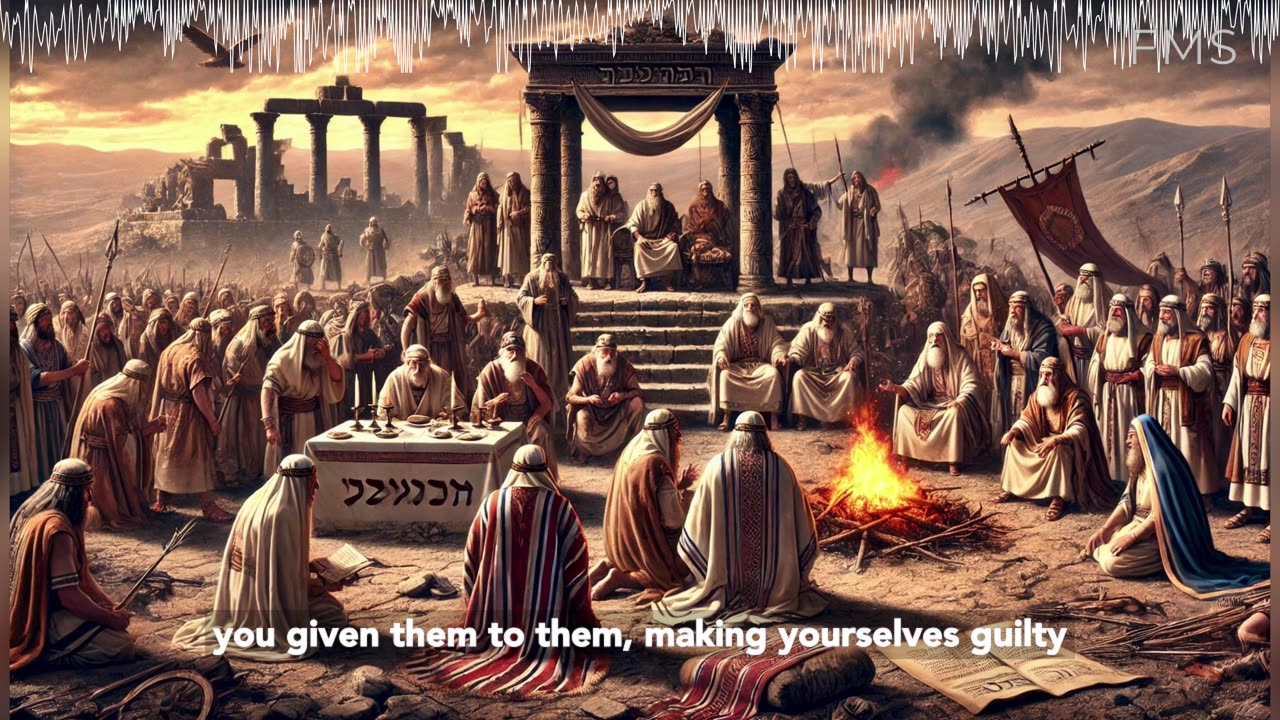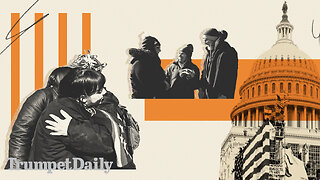Premium Only Content

Judges 21 The Aftermath of Civil War: Restoration and Irony
Judges 21 explores the aftermath of the devastating civil war between the tribes of Israel and the tribe of Benjamin. In this chapter, we witness the Israelites grappling with the consequences of their oath not to give their daughters to the Benjamites, leading to desperate and morally complex solutions to preserve the tribe of Benjamin.
Key Points:
* The Oath at Mizpah: The men of Israel had sworn not to give their daughters to the Benjamites, creating a significant dilemma after the near annihilation of Benjamin.
* Weeping and Seeking Yahuah: The Israelites mourn before Yahuah, questioning why one of their tribes should be missing and seeking divine guidance.
* Violent Solution: To provide wives for the surviving Benjamites, the Israelites attack Jabesh Gilead, sparing only 400 virgin women.
* Festival at Shiloh: When the 400 women are insufficient, the elders devise a plan involving the festival at Shiloh, where the Benjamites are instructed to capture women during the dances.
* Complex Morality: The chapter highlights the complex and often morally ambiguous decisions made by the Israelites, reflecting their struggle to uphold their oaths while preserving their tribal unity.
* Irony and Legacy: The irony of Benjamin, the "son of the right hand," being associated with left-handed warriors, underscores the tribe's unique and multifaceted legacy.
Reflection:
Judges 21 serves as a poignant conclusion to the book of Judges, illustrating the consequences of rash vows, the complexities of justice and survival, and the ongoing need for divine guidance. The chapter emphasizes the importance of unity and repentance, highlighting how far the Israelites had strayed from Yahuah's commandments.
Bonus Insight:
Just over 400 years before this tragic conflict, Benjamin, the youngest son of Jacob and Rachel, was favored by Joseph, who filled his plate five times fuller than his brothers' (Genesis 43:34). Rachel tragically died giving birth to Benjamin (Genesis 35:18-19). Despite this favor and familial bond, the tribe of Benjamin faced near eradication due to actions far removed from Yahuah's commandments. Benjamin barely survived his birth, and his mother, Rachel, was not buried in the tomb of the patriarchs. This might have been due to her stealing Laban's idols (Genesis 31:19), or another reason that will be revealed when Yahusha returns.
Discussion Topic: The Treatment of Women: Then vs. Now
Historical Context: In ancient Israel, women had limited autonomy and were often treated as property or pawns in political and social arrangements. Marriages were typically arranged by male relatives, and women had little say in these decisions.
* Judges 21 Example: The capture and forced marriage of the women of Shiloh to the Benjamites illustrates the lack of agency women had in their own lives. The Israelite elders' plan to solve the marriage crisis for Benjamin shows a pragmatic but ethically troubling approach to fulfilling their oath while ensuring the tribe's survival.
* Modern Perspective: Today, in most cultures, women have significantly more rights and autonomy. They can choose their partners, pursue careers, and have legal protections against forced marriage and gender-based violence. The shift reflects broader societal changes towards gender equality and human rights.
* Reflection and Discussion: How do the actions and attitudes towards women in Judges 21 contrast with contemporary values? What can we learn from these historical narratives about the progress and ongoing challenges in gender equality?
The Curse to Eve and Its Implications:
Genesis 3:16: After the fall, Yahuah said to Eve, "Your desire will be for your husband, and he will rule over you." This statement has been interpreted as the origin of the patriarchal structure in many societies, including ancient Israel. The subordination and limited autonomy of women seen in Judges 21 could be viewed as a continuation of this dynamic.
Discussion Point: Reflect on how the consequences of the fall in Genesis might have influenced the social structures and treatment of women in biblical times. How have interpretations of this passage evolved, and what impact do they have on modern views of gender equality?
-
 1:57:31
1:57:31
2 MIKES LIVE
14 hours ago2 MIKES LIVE #170 with special guest Rep. Buddy Carter (R-GA)
56.6K3 -
 1:02:58
1:02:58
Flyover Conservatives
1 day agoA Doctors Response to Trump’s First Moves: W.H.O. and FDA - Dr. Troy Spurrill; A REAL-LIFE Approach to Health and Wellness Transformation - Kellie Kuecha Moitt | FOC Show
86.9K6 -
 41:50
41:50
State of the Second Podcast
10 hours agoWhat do Gold and Guns have in common?
40.1K4 -
 1:01:26
1:01:26
PMG
6 hours ago $2.68 earnedLibs In FULL PANIC Since Trump Took Office! Creating a Faith to Fit their Agenda
28.9K9 -
 7:09:22
7:09:22
Dr Disrespect
14 hours ago🔴LIVE - DR DISRESPECT - TRIPLE THREAT CHALLENGE - EXTREME EDITION
258K32 -
 55:00
55:00
LFA TV
14 hours agoThe End of the January 6 Hoax | TRUMPET DAILY 1.22.25 7pm
48.6K12 -
 1:13:37
1:13:37
Battleground with Sean Parnell
12 hours agoPresident Trump Is On FIRE w/ Savage Rich Baris
187K27 -
 1:59:59
1:59:59
Melonie Mac
8 hours agoGo Boom Live Ep 34!
79.4K14 -
 49:27
49:27
Sarah Westall
7 hours agoTrillion Dollar 5G Lawsuit, Project Archimedes, Mind Control & DEW Weapons w/Attorney Todd Callender
80K38 -
 53:11
53:11
Standpoint with Gabe Groisman
1 day agoTrump Is Crucial For Hostage Agreement Says Israeli Colonel
56.6K5